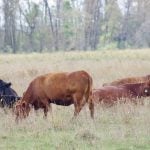More than 300,000 trees planted | The Carbon Farmer plants trees for clients who want to buy trees as gifts for carbon offsets
Alberta’s Parkland County got a little bit greener this summer after 91,000 white spruce were planted in the municipality.
However, county officials didn’t have to lift a shovel or open their chequebooks.
Instead, the trees were planted by The Carbon Farmer, an Alberta company that co-ordinates tree planting in exchange for carbon credits or with people who want to give a sustainable gift.
Besides the county’s recreation areas, the company also planted trees in Alberta Land Trust parks in the Edmonton area.
Read Also

Canadian farmers need level playing field for regulations – says Minister MacDonald
Federal agriculture minister Heath MacDonald is urging the Canadian Food Inspection Agency and the Pest Management Regulatory Agency to speed up their decision making.
The project is part of a request by a client who wants to plant 327,000 trees, the equivalent to the number of trees he has cut down.
Brad Raibey of The Carbon Farmer will co-ordinate the tree planting over two years in parts of the province where they will never be cut down.
“To see an initiative like this come forward is great,” said Parkland County mayor Rod Shaigec.
Next year, Raibey plans to plant for his client white spruce, jack pine, trembling aspen, white birch and balsam poplar, which are native to the area.
The Carbon Farmer started as a small pilot project in 2007 as a pilot project on Raibey’s family farm east of Manning in Alberta’s Peace River area.
The Raibeys have since planted 190,000 trees on their farm’s poorer quality land. One-third of the farm is now planted to trees.
The family has planted another 122,000 trees on other land.
The project is part of Alberta’s carbon offset credit system, in which large industrial carbon emitters must buy offset credits from other sectors that help reduce emissions in Alberta.
Raibey’s clients need to buy trees to offset their carbon footprint or replace trees that are cut down.
However, he also has smaller clients who want to give the gift of trees as wedding or Christmas gifts.
For Raibey, it’s one more income stream for the farm.
“We wanted to know what we could do to give us sustainability for people, place and profit,” he said.
The trees in the offset program were initially planted on Raibey’s farm, but now he is reaching out to other landowners and governments who have land where trees can be planted.
“The family farm is not big enough for those trees.”
The small seedling plugs come from either Woodmere Nursery in Fairview, Alta., or Coast to Coast Reforestation in Smoky Lake, Alta.
Raibey works with professional foresters to decide what trees have historically grown on the land.
He then does site preparation, hires tree planters and maintains the areas until the trees are established.
“We’re in the growth phase of the business,” said Raibey, whose Nov. 21 appearance on CBC’s The Dragon’s Den will include a request for funding for marketing and strategic partnership.
With the television show’s two million viewers, Raibey is hoping it will encourage people to visit his website to order trees as wedding gifts, Christmas gifts or as a way to offset their carbon footprint.
For $1.99 a tree, a wedding couple can buy trees online as thank you gifts for their guests.
Each tree will have a code to identify where it was planted.
“It’s a way to connect to the forest they helped create.”
This winter, Raibey will try to find landowners, including other municipalities, who want to have trees on their land.
“As clients come to us, we match them up.”
For other clients, each Carbon Plus Credit costs $15 and is the equivalent of about three trees and the reduction of one tonne of greenhouse gas emissions.














